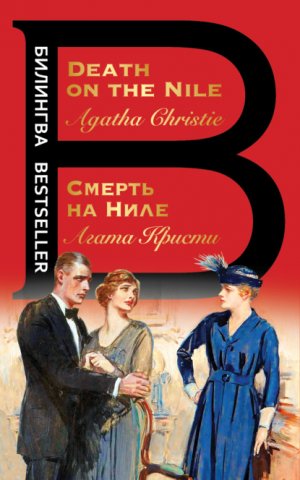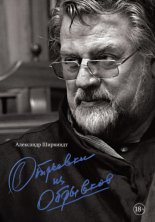—мерть на Ќиле / Death on the Nile ристи јгата

СTell Mr Rockford to step in here.Т
СYes, Mr Pennington.Т
A few minutes later, Sterndale Rockford, PenningtonТs partner, entered the office. The two men were not unlike Ц both tall, spare, with greying hair and cleanshaven clever faces.
СWhatТs up, Pennington?Т
Pennington looked up from the letter he was rereading. He said:
СLinnetТs marriedЕТ
СWhat?Т
СYou heard what I said! Linnet RidgewayТs married!Т
СHow? When? Why didnТt we hear about it?Т
Pennington glanced at the calendar on his desk.
СShe wasnТt married when she wrote this letter, but sheТs married now. Morning of the fourth. ThatТs today.Т
Rockford dropped into a chair.
СWhew! No warning! Nothing? WhoТs the man?Т
Pennington referred again to the letter.
СDoyle. Simon Doyle.Т
СWhat sort of a fellow is he? Ever heard of him?Т
СNo. She doesnТt say muchЕТ He scanned the lines of clear, upright hand writing. СGot an idea thereТs something hole-and-corner about this businessЕ That doesnТt matter. The whole point is, sheТs married.Т
The eyes of the two men met. Rockford nodded.
СThis needs a bit of thinking out,Т he said quietly.
СWhat are we going to do about it?Т
СIТm asking you.Т
The two men sat silent. Then Rockford said:
СGot any plan?Т
Pennington said slowly:
СThe Normandie sails today. One of us could just make it.Т
СYouТre crazy! WhatТs the big idea?Т
Pennington began: СThose Britisher lawyers-Т and stopped.
СWhat about Тem. Surely youТre not going over to tackle Тem? YouТre mad!Т
СIТm not suggesting that you Ц or I Ц should go to England.Т
СWhatТs the big idea, then?Т
Pennington smoothed out the letter on the table.
СLinnetТs going to Egypt for her honeymoon. Expects to be there a month or moreЕТ
СEgypt Ц eh?Т Rockford considered. Then he looked up and met the otherТs glance. СEgypt,Т he said; СthatТs your idea!Т
СYes Ц a chance meeting. Over on a trip. Linnet and her husband Ц honeymoon atmosphere. It might be done.Т
Rockford said doubtfully:
СSheТs sharp, Linnet isЕ but-Т
Pennington said softly: СI think there might be ways of Ц managing it.Т
Again their eyes met. Rockford nodded.
СAll right, big boy.Т
Pennington looked at the clock.
СWeТll have to hustle Ц whichever of us is going.Т
СYou go,Т said Rockford promptly. СYou always made a hit with Linnet. УUncle Andrew.Ф ThatТs the ticket!Т
PenningtonТs face had hardened.
He said: СI hope I can pull it off.Т
His partner said:
СYouТve got to pull it off. СThe situationТs criticalЕТ
Chapter 11
William Carmichael said to the thin, weedy youth who opened the door inquiringly:
СSend Mr Jim to me, please.Т
Jim Fanthorp entered the room and looked inquiringly at his uncle. The older man looked up with a nod and a grunt.
СHumph, there you are.Т
СYou asked for me?Т
СJust cast an eye over this.Т
The young man sat down and drew the sheaf of papers towards him. The elder man watched him.
СWell?Т
The answer came promptly.
СLooks fishy to me, sir.Т
Again the senior partner of Carmichael, Grant amp; Carmichael uttered his characteristic grunt.
Jim Fanthorp reread the letter which had just arrived by air mail from Egypt:
ЕIt seems wicked to be writing business letters on such a day. We have spent a week at Mena House and made an expedition to the Fayum. The day after tomorrow we are going up the Nile to Luxor and Aswan by steamer, and perhaps on to Khartoum. When we went into CookТs this morning to see about our tickets who do you think was the first person I saw?†Ц my American trustee, Andrew Pennington. I think you met him two years ago when he was over. I had no idea he was in Egypt and he had no idea that I was! Nor that I was married! My letter, telling him of my marriage, must just have missed him. He is actually going up the Nile on the same trip that we are. IsnТt it a coincidence? Thank you so much for all you have done in this busy time. I-
As the young man was about to turn the page, Mr Carmichael took the letter from him.
СThatТs all,Т he said. СThe rest doesnТt matter. Well, what do you think?Т
His nephew considered for a moment Ц then he said:
СWell Ц I think Ц not a coincidenceЕТ
The other nodded approval.
СLike a trip to Egypt?Т he barked out.
СYou think thatТs advisable?Т
СI think thereТs no time to lose.Т
СBut, why me?Т
СUse your brains, boy; use your brains. Linnet Ridgeway has never met you; no more has Pennington. If you go by air you may get there in time.Т
СIЦI donТt like it, sir. What am I to do?Т
СUse your eyes. Use your ears. Use your brains Ц if youТve got any. And if necessary Ц act.Т
СIЦI donТt like it.Т
СPerhaps not Ц but youТve got to do it.Т
СItТs Ц necessary?Т
СIn my opinion,Т said Mr Carmichael, СitТs absolutely vital.Т
Chapter 12
Mrs Otterbourne, readjusting the turban of local material that she wore draped round her head, said fretfully:
СI really donТt see why we shouldnТt go on to Egypt. IТm sick and tired of Jerusalem.Т
As her daughter made no reply, she said:
СYou might at least answer when youТre spoken to.Т
Rosalie Otterbourne was looking at a newspaper reproduction of a face. Below it was printed:
Mrs Simon Doyle, who before her marriage was the well-known society beauty, Miss Linnet Ridgeway. Mr and Mrs Doyle are spending their honeymoon in Egypt.
Rosalie said, СYouТd like to move on to Egypt, Mother?Т
СYes, I would,Т Mrs Otterbourne snapped. СI consider theyТve treated us in a most cavalier fashion here. My being here is an advertisement Ц I ought to get a special reduction in terms. When I hinted as much, I consider they were most impertinent Ц most impertinent. I told them exactly what I thought of them.Т
The girl sighed. She said:
СOne place is very like another. I wish we could get right away.Т
СAnd this morning,Т went on Mrs Otterbourne, Сthe manager actually had the impertinence to tell me that all the rooms had been booked in advance and that he would require ours in two daysТ time.Т
СSo weТve got to go somewhere.Т
СNot at all. IТm quite prepared to fight for my rights.Т
Rosalie murmured: СI suppose we might as well go on to Egypt. It doesnТt make any difference.Т
СItТs certainly not a matter of life or death,Т said Mrs Otterbourne.
But there she was quite wrong Ц for a matter of life and death was exactly what it was.
Part two
Egypt
Chapter 1
СThatТs Hercule Poirot, the detective,Т said Mrs Allerton.
She and her son were sitting in brightly painted scarlet basket chairs outside the Cataract Hotel in Aswan. They were watching the retreating figures of two people Ц a short man dressed in a white silk suit and a tall slim girl.
Tim Allerton sat up in an unusually alert fashion.
СThat funny little man?Т he asked incredulously.
СThat funny little man!Т
СWhat on earthТs he doing out here?Т Tim asked.
His mother laughed.
СDarling, you sound quite excited. Why do men enjoy crime so much? I hate detective stories and never read them. But I donТt think Monsieur Poirot is here with any ulterior motive. HeТs made a good deal of money and heТs seeing life, I fancy.Т
СSeems to have an eye for the best-looking girl in the place.Т
Mrs Allerton tilted her head a little on one side as she considered the retreating backs of M. Poirot and his companion.
The girl by his side overtopped him by some three inches. She walked well, neither stiffly nor slouchingly.
СI suppose she is quite good-looking,Т said Mrs Allerton.
She shot a little glance sideways at Tim. Somewhat to her amusement the fish rose at once.
СSheТs more than quite. Pity she looks so bad-tempered and sulky.Т
СPerhaps thatТs just expression, dear.Т
СUnpleasant young devil, I think. But sheТs pretty enough.Т
The subject of these remarks was walking slowly by PoirotТs side. Rosalie Otterbourne was twirling an unopened parasol, and her expression certainly bore out what Tim had just said. She looked both sulky and bad-tempered. Her eyebrows were drawn together in a frown, and the scarlet line of her mouth was drawn downwards.
They turned to the left out of the hotel gate and entered the cool shade of the public gardens.
Hercule Poirot was prattling gently, his expression that of beatific good humour. He wore a white silk suit, carefully pressed, and a panama hat, and carried a highly ornamental fly whisk with a sham amber handle.
С-it enchants me,Т he was saying. СThe black rocks of Elephantine, and the sun, the little boats on the river. Yes, it is good to be alive.Т He paused and then added: СYou do not find it so, Mademoiselle?Т
Rosalie Otterbourne said shortly:
СItТs all right, I suppose. I think AswanТs a gloomy sort of place. The hotelТs half empty, and everyoneТs about a hundred-Т
She stopped Ц biting her lip.
Hercule PoirotТs eyes twinkled.
СIt is true, yes, I have one leg in the grave.Т
СIЦI wasnТt thinking of you,Т said the girl. СIТm sorry. That sounded rude.Т
СNot at all. It is natural you should wish for young companions of your own age. Ah, well, there is one young man, at least.Т
СThe one who sits with his mother all the time? I like her Ц but I think he looks dreadful Ц so conceited!Т
Poirot smiled.
СAnd I Ц am I conceited?Т
СOh, I donТt think so.Т
She was obviously uninterested Ц but the fact did not seem to annoy Poirot. He merely remarked with placid satisfaction:
СMy best friend says that I am very conceited.Т
СOh, well,Т said Rosalie vaguely, СI suppose you have something to be conceited about. Unfortunately crime doesnТt interest me in the least.Т
Poirot said solemnly:
СI am delighted to learn that you have no guilty secret to hide.Т
Just for a moment the sulky mask of her face was transformed as she shot him a swift questioning glance. Poirot did not seem to notice it as he went on.
СMadame, your mother, was not at lunch today. She is not indisposed, I trust?Т
СThis place doesnТt suit her,Т said Rosalie briefly. СI shall be glad when we leave.Т
СWe are fellow passengers, are we not? We both make the excursion up to Wadi Halfa and the Second Cataract?Т
СYes.Т
They came out from the shade of the gardens on to a dusty stretch of road bordered by the river. Five watchful bead sellers, two vendors of postcards, three sellers of plaster scarabs, a couple of donkey boys and some detached but hopeful infantile riff-raff closed in upon them.
СYou want beads, sir? Very good, sir. Very cheapЕТ
СLady, you want scarab? Look Ц great queen Ц very luckyЕТ
СYou look, sir Ц real lapis. Very good, very cheapЕТ
СYou want ride donkey, sir? This very good donkey. This donkey Whiskey and Soda, sirЕТ
СYou want to go granite quarries, sir? This very good donkey. Other donkey very bad, sir, that donkey fall downЕТ
СYou want postcard Ц very cheap Ц very niceЕТ
СLook, ladyЕ Only ten piastres Ц very cheap Ц lapis Ц this ivoryЕТ
СThis very good fly whisk Ц this all amberЕТ
СYou go out in boat, sir? I got very good boat, sirЕТ
СYou ride back to hotel, lady? This first-class donkeyЕТ
Hercule Poirot made vague gestures to rid himself of this human cluster of flies. Rosalie stalked through them like a sleep walker.
СItТs best to pretend to be deaf and blind,Т she remarked.
The infantile riff-raff ran alongside murmuring plaintively:
СBakshish? Bakshish? Hip hip hurrah Ц very good, very niceЕТ
Their gaily coloured rags trailed picturesquely, and the flies lay in clusters on their eyelids. They were the most persistent. The others fell back and launched a fresh attack on the next corner. Now Poirot and Rosalie only ran the gauntlet of the shops Ц suave, persuasive accents hereЕ
СYou visit my shop today, sir?Т
СYou want that ivory crocodile, sir?Т
СYou not been in my shop yet, sir? I show you very beautiful things.Т
They turned into the fifth shop and Rosalie handed over several rolls of film Ц the object of the walk.
Then they came out again and walked towards the riverТs edge.
One of the Nile steamers was just mooring. Poirot and Rosalie looked interestedly at the passengers.
СQuite a lot, arenТt there?Т commented Rosalie.
She turned her head as Tim Allerton came up and joined them. He was a little out of breath as though he had been walking fast. They stood there for a moment or two, and then Tim spoke.
СAn awful crowd as usual, I suppose,Т he remarked disparagingly, indicating the disembarking passengers.
СTheyТre usually quite terrible,Т agreed Rosalie. All three wore the air of superiority assumed by people who are already in a place when studying new arrivals.
СHallo!Т exclaimed Tim, his voice suddenly excited. СIТm damned if that isnТt Linnet Ridgeway.Т
If the information left Poirot unmoved, it stirred RosalieТs interest. She leaned forward and her sulkiness quite dropped from her as she asked:
СWhere? That one in white?Т
СYes, there with the tall man. TheyТre coming ashore now. HeТs the new husband, I suppose. CanТt remember her name now.Т
СDoyle,Т said Rosalie. СSimon Doyle. It was in all the newspapers. SheТs simply rolling, isnТt she?Т
СOnly about the richest girl in England,Т said Tim cheerfully.
The three lookers-on were silent watching the passengers come ashore. Poirot gazed with interest at the subject of the remarks of his companions. He murmured:
СShe is beautiful.Т
СSome people have got everything,Т said Rosalie bitterly.
There was a queer grudging expression on her face as she watched the other girl come up the gangplank.
Linnet Doyle was looking as perfectly turned out as if she were stepping on to the centre of the stage in a revue. She had something too of the assurance of a famous actress. She was used to being looked at, to being admired, to being the centre of the stage wherever she went.
She was aware of the keen glances bent upon her Ц and at the same time almost unaware of them; such tributes were part of her life.
She came ashore playing a role, even though she played it unconsciously. The rich, beautiful society bride on her honeymoon. She turned, with a little smile and a light remark, to the tall man by her side. He answered, and the sound of his voice seemed to interest Hercule Poirot. His eyes lit up and he drew his brows together.
The couple passed close to him. He heard Simon Doyle say:
СWeТll try and make time for it, darling. We can easily stay a week or two if you like it here.Т
His face was turned towards her, eager, adoring, a little humble.
PoirotТs eyes ran over him thoughtfully Ц the square shoulders, the bronzed face, the dark blue eyes, the rather childlike simplicity of the smile.
СLucky devil,Т said Tim after they had passed. СFancy finding an heiress who hasnТt got adenoids and flat feet!Т
СThey look frightfully happy,Т said Rosalie with a note of envy in her voice. She said suddenly, but so low that Tim did not catch the words: СIt isnТt fair.Т
Poirot heard, however. He had been frowning somewhat perplexedly, but now he flashed a quick glance towards her.
Tim said:
СI must collect some stuff for my mother now.Т
He raised his hat and moved off. Poirot and Rosalie retraced their steps slowly in the direction of the hotel, waving aside fresh proffers of donkeys.
СSo it is not fair, Mademoiselle?Т asked Poirot gently.
The girl flushed angrily.
СI donТt know what you mean.Т
СI am repeating what you said just now under your breath. Oh, yes, you did.Т
Rosalie Otterbourne shrugged her shoulders.
СIt really seems a little too much for one person. Money, good looks, marvellous figure and-Т
She paused and Poirot said:
СAnd love? Eh? And love? But you do not know Ц she may have been married for her money!Т
СDidnТt you see the way he looked at her?Т
СOh, yes, Mademoiselle. I saw all there was to see Ц indeed I saw something that you did not.Т
СWhat was that?Т
Poirot said slowly:
СI saw, Mademoiselle, dark lines below a womanТs eyes. I saw a hand that clutched a sunshade so tight that the knuckles were whiteЕТ
Rosalie was staring at him.






